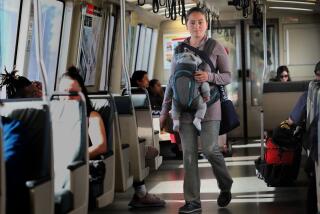Experiment in Minnesota : Welfare Recipients Get Cash at Teller Machines
- Share via
ST. PAUL, Minn. — Welfare recipients began receiving their monthly payments from electronic cash machines Monday in an experimental program sponsors say is the first of its kind in the nation.
Plastic cards have been issued to 1,000 recipients of Aid to Families with Dependent Children participating in Ramsey County’s six-month pilot project, enabling them to collect all or part of their payments by machine.
Ends Fear of Theft
“You don’t have to worry about your check being stolen out of the mailbox,” Michelle House of St. Paul said after she used one of the new machines at a Sears, Roebuck & Co. store near the state Capitol.
The program is expected to reduce disbursement costs and ease the county’s problems in finding depository banks willing to have their lobbies crowded with AFDC recipients on the first of the month.
In 1979, the county was unable to find a bank willing to handle its account, said Tom Fashingbauer, human services director for the county, which includes metropolitan St. Paul.
In 1986, the county set up its own check-cashing system.
While searching for a way to simplify and improve the process, the county received a proposal from TransFirst Corp., a Dallas-based subsidiary of First Texas Financial Corp., to test the plastic cards for disbursing benefits.
Under the project, one-third of the 1,000 participants can use existing Norwest Bank 24-hour Instant Cash machines or automatic-teller machines, installed exclusively for welfare recipients, with special screens that use symbols to help recipients who cannot read well.
A second group uses operator-assisted automatic-teller machines at three stores. Clerks operate the machines, which can be used to obtain cash or to pay for products. The third group can use any of the machines.
Among the advantages of the machines, Fashingbauer said, are that recipients do not have to carry their entire month’s payment around with them and participating stores get immediate payment.
“From the county’s point of view, we knew it would cost over $2.50 to produce a check. With the automated system, we know it will cost at least a dollar less per check,” Fashingbauer said.
Can Stop Payments
“It’s going to save us money to do what we have to do anyhow. If we find someone is not eligible in the middle of the month, we can stop payment immediately.”
Eventually, the county hopes to expand the program to include its entire public assistance roll, an estimated 17,000 people a month, Fashingbauer said. Other potential uses for the machines include medical assistance payments to doctors and forwarding child support payments and unemployment compensation, he said.
More to Read
Sign up for Essential California
The most important California stories and recommendations in your inbox every morning.
You may occasionally receive promotional content from the Los Angeles Times.













